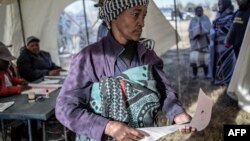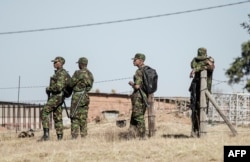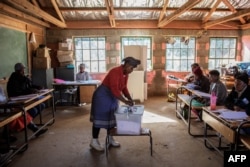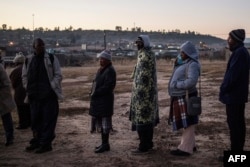Soldiers with automatic rifles hovered in the background of polling stations as voters in the tiny Southern African nation of Lesotho cast ballots Saturday — prompting concerns from election officials and politicians in a nation with a troubled political history.
“Why would there be soldiers in a peaceful exercise of democratic rights? There has not been a security concern,” said Moeketsi Majoro, the spokesman for the current opposition, All Basotho Convention, to VOA. “Why are they fully armed? So the first impression is that they are there to intimidate.”
That’s because the military has long been tightly entwined with this nation’s political woes. The army led a 1986 coup to push out a long-serving government. In this century, Lesotho’s military has been involved in a number of political actions, including an action that pushed ABC leader and then-prime minister Tom Thabane into exile in 2014, after just two years in power.
In the capitol, Maseru, election officials at several polling stations quietly voiced their concerns about the soldiers’ presence, to VOA. The head of the nation’s electoral commission said, in a tweet, that he also was concerned and that he had reported their presence to observers.
This vote is, for many, a final shot at much-needed peace and stability after five years of fractious politics that saw two coalitions collapse. Most recently, the opposition ousted Prime Minister Pakalitha Mosisili in a no-confidence vote earlier this year, prompting these snap elections. This contest is yet again a battle between Mosisili, who leads the Democratic Congress, and Thabane, his old rival.
VOA spotted squads of soldiers at five polling stations in the capital, and approached one group of five. They were friendly, relaxed — and even, they said, bored. They said they had been ordered to assist the electoral commission and to stay outside the stations through ballot-counting. Each soldier held an automatic rifle.
Thabane said security-sector reforms are a crucial part of his plan if he wins.
“Lesotho must now become a full member of the international community that lives according to the basic principles of democracy,” he said after voting on Saturday. “Regular elections are some of those. Control of the army, control of the police by civilian authority — all those things are part and parcel of true democracy. This hasn’t happened quite a lot in Africa. I am meaning before I retire to make Lesotho a beacon of hope for all Africa.”
Some 1.2 million voters took to the polls to choose seats in 80 constituencies. The largest party or coalition will choose the prime minister. Lesotho has a king whose role is largely ceremonial, and who is not allowed to vote. Results are expected Monday.
Augustine Mahiga, head of the observer mission for the Southern African Development Community, says he hopes not to be back in under five years, and is confident that the regional body’s push for reforms will finally take hold.
“Of course we would have liked to see a normal voting cycle, which is five years,” he said. “But this is the third within five years, not even exhausted five years. This what the SADC heads of state have always been expressing concern about the political situation in Lesotho, and we think this time around the leadership and the government that will come in place, and other stakeholders, will embark on a serious exercise to engage in reforms.”
These are not the only changes that voters want to see in this impoverished, yet water- and diamond-rich nation.
Joseph Khabane shivered as he waited in a snaking queue just outside Lesotho’s capital. The 60-year-old is unemployed, and so had all the time in the world to cast his vote.
But, he said, he was so eager that he arrived before the station opened at dawn, huddling with hundreds of others who wrapped themselves in traditional wool blankets in the pre-dawn chill.
“We have to vote. Definitely we have to vote, so that we elect someone who we think is going to make life easier for us because so far, the previous government did not help. We are getting poorer and poorer in their service. So we want some change.”







